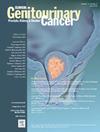Adjuvant Immunotherapy in High-Risk Muscle-Invasive Urothelial Cancer: An Updated Meta-Analysis of Randomized Controlled Trials
IF 2.7
3区 医学
Q3 ONCOLOGY
引用次数: 0
Abstract
Introduction
Neoadjuvant cisplatin-based chemotherapy followed by radical surgery is the standard treatment for muscle-invasive urothelial carcinoma (MIUC). The Checkmate-274 and AMBASSADOR trials have demonstrated improvements in disease-free survival (DFS) with adjuvant immunotherapy. Consequently, this meta-analysis aimed to assess the effectiveness of strategies involving checkpoint inhibitors in managing high-risk MIUC.
Patients and Methods
We searched PubMed, Embase, Cochrane, ClinicalTrials.gov, EAU24, and ASCO GU abstracts for randomized controlled trials (RCTs) comparing adjuvant PD-1 and PD-L1 inhibitors against control (placebo or observation) for MIUC. Outcomes included DFS, grade ≥3 adverse events (AEs), and overall survival (OS). Heterogeneity was assessed using I2 statistics, employing a random-effects model for analysis.
Results
In a cohort of 2220 patients from three RCTs, 1,113 (50.14%) underwent adjuvant immunotherapy. This treatment significantly increased DFS (HR 0.76; 95% CI, 0.65-0.90; P < .01), particularly in lower tract tumors (HR 0.71; 95% CI, 0.56-0.91; P < .01). No substantial DFS improvement surfaced in the upper tract subgroup (P = .28) (p-interaction = .01). PD-L1 status (p-interaction = .83) and previous neoadjuvant chemotherapy (p-interaction = .11) did not significantly affect outcomes. However, immunotherapy correlated with higher grade ≥3 AEs (RR 1.47; P < .01), with no notable difference in OS (P = .07).
Conclusions
Adjuvant PD-1/PD-L1 inhibitors notably enhance MIUC DFS, particularly in lower tract tumors, regardless of PD-L1 status. These findings support immunotherapy, especially anti-PD1, as a valuable adjuvant treatment strategy for high-risk MIUC patients.
高危肌肉侵袭性尿路上皮癌的辅助免疫治疗:随机对照试验的最新荟萃分析
新辅助顺铂化疗后根治性手术是肌肉侵袭性尿路上皮癌(MIUC)的标准治疗方法。Checkmate-274和AMBASSADOR试验表明,辅助免疫治疗可改善无病生存期(DFS)。因此,本荟萃分析旨在评估涉及检查点抑制剂的策略在管理高风险MIUC中的有效性。患者和方法:我们检索了PubMed, Embase, Cochrane, ClinicalTrials.gov, EAU24和ASCO GU摘要,以比较辅助PD-1和PD-L1抑制剂与对照组(安慰剂或观察)治疗MIUC的随机对照试验(rct)。结果包括DFS、≥3级不良事件(ae)和总生存期(OS)。采用I2统计量评估异质性,采用随机效应模型进行分析。结果:来自3个随机对照试验的2220例患者中,1113例(50.14%)接受了辅助免疫治疗。该治疗显著提高了DFS (HR 0.76;95% ci, 0.65-0.90;P < 0.01),尤其是下道肿瘤(HR 0.71;95% ci, 0.56-0.91;P < 0.01)。上尿路亚组无明显的DFS改善(P = 0.28) (P -相互作用= 0.01)。PD-L1状态(p-相互作用= 0.83)和以前的新辅助化疗(p-相互作用= 0.11)对结果没有显著影响。然而,免疫治疗与更高级别≥3 ae相关(RR 1.47;P < 0.01), OS差异无统计学意义(P = 0.07)。结论:与PD-L1状态无关,佐剂PD-1/PD-L1抑制剂可显著增强MIUC DFS,尤其是下道肿瘤。这些发现支持免疫治疗,特别是抗pd1,作为高风险MIUC患者的一种有价值的辅助治疗策略。
本文章由计算机程序翻译,如有差异,请以英文原文为准。
求助全文
约1分钟内获得全文
求助全文
来源期刊

Clinical genitourinary cancer
医学-泌尿学与肾脏学
CiteScore
5.20
自引率
6.20%
发文量
201
审稿时长
54 days
期刊介绍:
Clinical Genitourinary Cancer is a peer-reviewed journal that publishes original articles describing various aspects of clinical and translational research in genitourinary cancers. Clinical Genitourinary Cancer is devoted to articles on detection, diagnosis, prevention, and treatment of genitourinary cancers. The main emphasis is on recent scientific developments in all areas related to genitourinary malignancies. Specific areas of interest include clinical research and mechanistic approaches; drug sensitivity and resistance; gene and antisense therapy; pathology, markers, and prognostic indicators; chemoprevention strategies; multimodality therapy; and integration of various approaches.
 求助内容:
求助内容: 应助结果提醒方式:
应助结果提醒方式:


